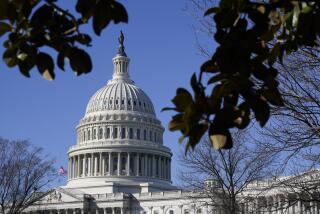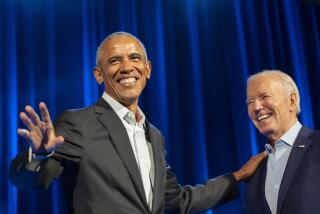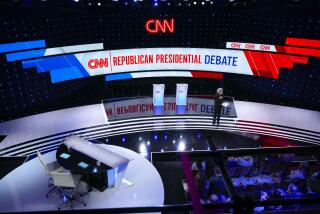Obama campaign urges donors to back ‘super PAC’
In the latest ratcheting-up of this year’s political arms race, President Obama has given the go-ahead to his donors to contribute funds to a “super PAC” set up by two of his former aides, a reversal of his previous opposition to the involvement of outside groups in the campaign.
Campaign manager Jim Messina announced the decision on the Obama 2012 website, writing that while the president is against big money in politics -- a trend that has been accelerated by the Supreme Court’s decision in the 2010 Citizens United case -- “our campaign has to face the reality of the law as it currently stands.”
Messina noted that super PACs allied with the GOP presidential hopefuls spent more than $40 million on television and radio ads in the last few months and that conservative groups together could spend as much as $500 million on the 2012 campaign.
“With so much at stake, we can’t allow for two sets of rules in this election whereby the Republican nominee is the beneficiary of unlimited spending and Democrats unilaterally disarm,” Messina said.
To that end, the campaign is now asking its donors to contribute to Priorities USA, a super PAC set up by Bill Burton and Sean Sweeney, two former White House aides. The move was first reported by the New York Times.
The group raised $4.4 million last year, far less than super PACs working on behalf of Obama’s Republican challengers.
Super PACs -- which came into being two years ago after a series of court decisions, including Citizens United – have already upended this year’s presidential primaries because of their ability to raise massive sums of money, without the contribution limits constraining candidates or political parties. The move by the Obama campaign guarantees the groups will have an even larger presence in the coming months.
“What this change means practically: Senior campaign officials as well as some White House and Cabinet officials will attend and speak at Priorities USA fundraising events,” Messina wrote. “While campaign officials may be appearing at events to amplify our message, these folks won’t be soliciting contributions for Priorities USA. I should also note that the president, vice president, and first lady will not be a part of this effort; their political activity will remain focused on the president’s campaign.”
In making the move, the campaign is taking advantage of a controversial decision by the Federal Election Commission to allow candidates to appear at fundraisers for super PACs working on their behalf. While super PACs are supposed to function independently of the candidates and parties, the FEC determined that such fundraising appearances did not amount to coordination.
That led former Massachusetts Gov. Mitt Romney to previously attend an event to benefit Restore Our Future, a super PAC working on his behalf.
Messina said the campaign would be careful to operate within the bounds of the law. He conveyed the news Monday to the super PAC through the campaign’s lawyer, who informed the election law attorney working for Priorities, who in turn told Burton.
“As has become evident in the past month, the only enthusiasm in the Republican Party is among oil company billionaires and investment bankers on Wall Street looking to defeat President Obama,” Burton said in a statement. “We’re committed to providing a balance to Karl Rove and the Koch brothers who have pledged more than half a billion dollars to their effort.”
In urging donors to contribute big checks to combat the money on the other side, Obama runs the risk of tarnishing his image as an opponent of moneyed interests. It’s an issue he has pressed since the 2010 State of the Union address, when he warned that Citizens United would “open the floodgates for special interests.” The president spent much of the 2010 midterms campaigning on that theme.
His sudden embrace of a vehicle that has allowed a gusher of big money into the campaign could turn off supporters and alienate other Democratic officials. Monday’s decision to reverse course comes on the heels of a vow by Senate Democrats to step up the scrutiny of super PACs and other outside groups.
“This is a brazenly cynical move by Barack Obama and his political handlers, who just a year ago had the chutzpah to call outside groups a threat to democracy,” said Jonathan Collegio, a spokesman for American Crossroads, the major GOP super PAC.
In an interview that aired Monday morning, NBC’s Matt Lauer asked Obama directly about the influence of money in the campaigns.
“If you ask me, would I love to take some of the big money out of politics, I would. Unfortunately, right now, partly because of Supreme Court rulings and a bunch of decisions out there, it is very hard to be able to get your message out without having some resources,” he said.
Asked if he might consider sitting down with the eventual GOP nominee and discuss a strategy to avoid an avalanche of negative advertising on both sides, Obama was decidedly noncommittal.
“One of the worries we have, obviously, in the next campaign is that there are so many of these so-called super PACs, these independent expenditures that are going to be out there, there’s going to be just a lot of money floating around. And I guarantee you a bunch of that’s going to be negative,” he said. “But it’s not going to enough just to say the other guy is a bum. You’ve got to explain to the American people what your plan is to make sure that they’re good jobs at good wages and that this economy is growing over the long term. And whoever wins that argument, I think, is going to be the next president.”
Melanie Mason and Michael A. Memoli in Washington contributed to this report.
More to Read
Start your day right
Sign up for Essential California for news, features and recommendations from the L.A. Times and beyond in your inbox six days a week.
You may occasionally receive promotional content from the Los Angeles Times.






